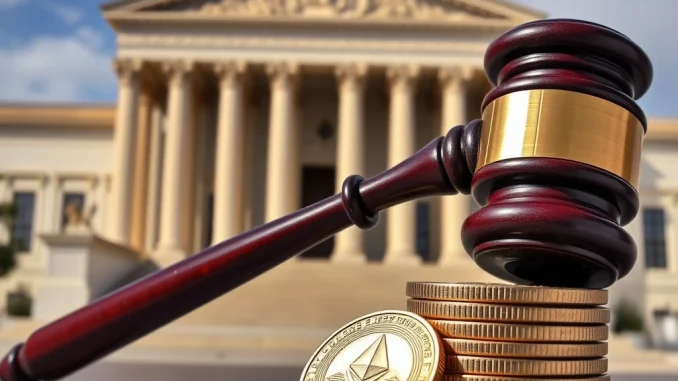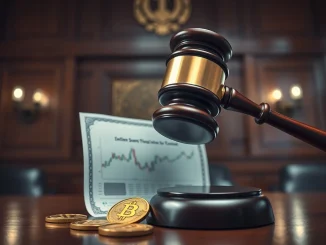
In a surprising turn of events, the crypto world is holding its breath as a U.S. federal judge has decided to pump the brakes on a high-stakes legal battle. Yes, you heard it right! The lawsuit filed by 18 state attorneys general and the DeFi Education Fund (DEF) against the Securities and Exchange Commission (SEC) has been temporarily paused. This move is injecting a fresh dose of uncertainty and anticipation into the ongoing saga of crypto regulation in the United States. Let’s dive into what this pause means, why it matters, and what could be next in this fascinating legal drama.
Why is the SEC Lawsuit on Hold?
So, what exactly led to this unexpected pause in the SEC lawsuit? As reported by CoinDesk, the lawsuit, initiated back in November by a coalition of Republican state attorneys general and the DeFi Education Fund, challenges the SEC’s aggressive approach towards cryptocurrency exchanges. The core argument? These attorneys general and DEF believe the SEC has been overstepping its boundaries, wielding its power like a regulatory hammer against the burgeoning crypto industry.
The judge’s decision to pause the lawsuit suggests a need for further consideration or perhaps a procedural step that needs to be addressed before the legal proceedings can continue. While the exact reasons for the pause haven’t been explicitly detailed in the initial reports, it’s clear that the court is taking a cautious approach to this complex case. This pause could be for various reasons, such as:
- Review of Preliminary Motions: The court might need time to review preliminary motions filed by either side before proceeding with the substantive arguments.
- Jurisdictional Issues: There might be questions about jurisdiction or the proper venue for the lawsuit that the judge needs to resolve.
- Mediation or Settlement Discussions: Although less likely at this stage, a pause could sometimes indicate an opportunity for parties to explore mediation or settlement outside of court proceedings.
Whatever the reason, this pause is a significant development in the ongoing tug-of-war between crypto innovators and regulatory bodies.
DeFi Education Fund’s Stand: Why Are They Suing the SEC?
The DeFi Education Fund (DEF) might sound like a newcomer to some, but they’ve quickly become a vocal advocate for decentralized finance within the crypto space. Teaming up with 18 state attorneys general to sue the SEC is no small feat, so what’s driving their strong stance?
The DEF’s involvement in this lawsuit underscores a growing concern within the crypto industry – the belief that the SEC is regulating through enforcement rather than clear rulemaking. Here’s a breakdown of DEF’s perspective:
- Challenging SEC’s Authority: DEF argues that the SEC is exceeding its statutory authority by applying securities laws to crypto assets in a way that stifles innovation and unfairly targets the industry.
- Lack of Clear Guidelines: A central point of contention is the SEC’s perceived failure to provide clear and consistent guidelines for crypto businesses to operate within legal boundaries. This lack of clarity makes compliance a moving target, according to DEF.
- Protecting DeFi Innovation: As their name suggests, the DeFi Education Fund is deeply invested in the future of decentralized finance. They view the SEC’s enforcement actions as a threat to the growth and development of DeFi technologies and platforms.
By joining forces with state attorneys general, DEF is amplifying its voice and leveraging legal avenues to push back against what they see as regulatory overreach. Their involvement highlights the deep-seated frustration within parts of the crypto community regarding the SEC’s regulatory approach.
The Broader Picture: Crypto Regulation in the US
This lawsuit pause occurs against a backdrop of intense debate and uncertainty surrounding crypto regulation in the United States. The SEC, under Chair Gary Gensler, has adopted a more assertive stance on crypto, viewing many digital assets as securities and thus falling under their regulatory purview. This approach has been met with both support and strong opposition.
Arguments for stricter regulation often center on:
- Investor Protection: Proponents argue that robust regulation is necessary to protect investors from fraud, market manipulation, and the inherent risks associated with volatile crypto assets.
- Financial Stability: Concerns exist about the potential impact of unregulated crypto markets on broader financial stability, especially as crypto adoption grows.
- Combating Illicit Activities: Regulation is seen as crucial for preventing the use of cryptocurrencies for illegal activities such as money laundering and terrorist financing.
On the other hand, those advocating for a lighter regulatory touch emphasize:
- Innovation and Economic Growth: Overly strict regulations could stifle innovation, drive crypto businesses overseas, and hinder the economic potential of blockchain technology.
- Technological Nuance: Critics argue that applying traditional securities laws to decentralized technologies is a poor fit and fails to understand the unique nature of crypto assets.
- Clarity and Predictability: The industry is calling for clearer rules of the road, arguing that regulation through enforcement creates uncertainty and makes it difficult to operate legally and compliantly.
The pause in the lawsuit reflects this ongoing tension and underscores the need for a balanced and thoughtful approach to crypto regulation that fosters innovation while addressing legitimate concerns.
Impact on Cryptocurrency Exchanges and the Market
The SEC’s actions, often targeting cryptocurrency exchanges, have sent ripples throughout the digital asset market. The lawsuit pause and the underlying legal challenge have significant implications for these exchanges and the broader market sentiment.
Potential Impacts on Crypto Exchanges:
- Reduced Regulatory Pressure (Temporary): The pause could be interpreted as a temporary reprieve for crypto exchanges facing SEC scrutiny, potentially easing immediate regulatory pressure.
- Increased Uncertainty (Long-Term): However, the pause also injects more uncertainty into the long-term regulatory landscape. Exchanges are left wondering about the future direction of SEC enforcement and the ultimate outcome of the legal challenges.
- Strategic Reassessment: Exchanges might use this time to reassess their compliance strategies, legal positions, and engagement with regulators, preparing for various potential outcomes.
Market Sentiment:
- Short-Term Relief Rally: News of the lawsuit pause could trigger a short-term positive reaction in the crypto market, as it signals a potential pushback against aggressive SEC enforcement.
- Caution Prevails: However, market participants are likely to remain cautious, recognizing that the underlying regulatory issues are far from resolved. Long-term market trends will depend on how these legal and regulatory battles unfold.
- Focus on Regulatory Clarity: The events underscore the market’s desire for regulatory clarity. Until there’s a clearer framework, volatility and uncertainty are likely to remain features of the crypto market.
Federal Judge’s Decision: A Sign of Shifting Tides?
The decision by a federal judge to pause the lawsuit raises questions about whether this signals a potential shift in the legal and regulatory landscape for crypto. While it’s premature to draw definitive conclusions, this move could indicate:
- Judicial Scrutiny of SEC Actions: The pause might suggest that the judiciary is willing to take a closer look at the SEC’s approach to crypto regulation and is not simply deferring to the agency’s interpretation of its own powers.
- Growing Legal Challenges: This case is just one example of increasing legal challenges to the SEC’s crypto enforcement actions. The pause could embolden others to pursue similar legal strategies.
- Potential for Negotiation: While speculative, a pause could create an environment where the SEC might be more open to dialogue and negotiation with the crypto industry to find more constructive regulatory pathways.
It’s important to remember that a pause is not a victory or defeat in itself. It’s a procedural step that provides an opportunity for further consideration. The ultimate outcome of the lawsuit and its broader implications for crypto regulation remain to be seen.
Looking Ahead: What’s Next in the Crypto Regulatory Saga?
The pause in the SEC lawsuit is a significant moment, but it’s just one chapter in the ongoing story of crypto regulation. Here’s what to watch for:
- Court’s Next Steps: The immediate focus will be on understanding the court’s reasons for the pause and what procedural steps will follow. Will there be further hearings, requests for additional information, or a timeline for resuming the case?
- SEC’s Response: How will the SEC react to this legal challenge and the pause? Will they adjust their enforcement strategy, or will they double down on their current approach?
- Legislative Developments: Simultaneously, legislative efforts to create a more comprehensive crypto regulatory framework are underway in Congress. The outcome of these legislative initiatives will be crucial in shaping the future of crypto regulation.
- Industry Engagement: The crypto industry will likely continue to engage with regulators, lawmakers, and the courts to advocate for clearer and more balanced regulations that foster innovation while addressing legitimate concerns.
In Conclusion: A Breath of Uncertainty in Crypto Regulation
The U.S. federal judge’s decision to pause the lawsuit against the SEC is a noteworthy development that injects a dose of uncertainty into the world of crypto regulation. While it may offer a temporary sense of relief for the crypto industry, it also underscores the ongoing legal and regulatory battles that are shaping the future of digital assets. The coming months will be critical in determining the next steps in this legal saga and the broader direction of crypto regulation in the United States. Stay tuned, because the story of crypto and regulation is far from over, and the next chapter promises to be just as engaging and impactful as the last.



